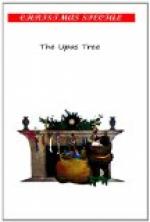“I am fagged out,” said Ronnie, wearily.
Aubrey went to a cupboard, poured something into a glass, and handed it to Ronald.
“Drink this, my boy. It will soon wake you up.”
Ronnie drank it. Its tint was golden, its odour, fragrant; but otherwise, for aught he knew, it might have been pure water.
He sat up and took careful note of his surroundings.
Then an idea seemed to strike him. He leaned forward and twanged the strings of his ’cello. They were not in tune.
“Will you lend me your tuning-fork?” he said to Aubrey.
But Aubrey had expected this.
“Sorry,” he said. “I don’t possess one, just now. I gave away mine last week. You can tune your ’cello by the organ.”
“I don’t know how to tune a ’cello,” said Ronnie.
“Let me show you,” suggested Aubrey, with the utmost friendliness.
He walked over to the organ, drew out the ’cello stop, sounded a note, then came back humming it.
Then he took up the Infant and carefully tuned the four strings, talking easily meanwhile.
“You see? You screw up the pegs—so. The notes are A, D, G, C.”
“What have you done to your lip?” said Ronald, suddenly.
“Knocked it on the stove just now, as I bent to stoke it with my fingers, for fear of waking you. It bled amazingly.”
Aubrey produced a much-stained handkerchief.
“It is curious how a tiny knock will sometimes draw as much blood as a sword-thrust. There! The Infant is in perfect tune, so far as I can tell without the bow. Do you mind if I just pass the bow across the strings? After each string is perfectly tuned to a piano or organ, you must make them vibrate together in order to get the fifths perfect. A violin or a ’cello is capable of a more complete condition of intuneness—if I may coin a word—than an organ or a piano.”
He took up the bow, then with careful precision sounded the strings, singly and together. The beautiful open notes of the Infant of Prague, filled the room.
“There,” said Aubrey, putting it back against the empty chair. “I am afraid that is all I must attempt. I only play the fiddle. I might disappoint you in your Infant if I did more than sound the open strings.”
Ronald passed his hand over his forehead. “When did I fall asleep?” he asked.
“Just after suggesting that we should not discuss your books or your public.”
“Ah, I remember! Treherne, I have had the most vivid and horrid nightmares.”
“Then forget them,” put in Aubrey, quickly. “Never recount a nightmare, when it is over. You suffer all its horrors again, in the telling. Turn your thoughts to something pleasant. When do you reach England?”
“I cross by the Hook, the day after to-morrow, reaching London early the following morning. I shall go to my club, see my publisher, lunch in town, and get down home to tea.”




